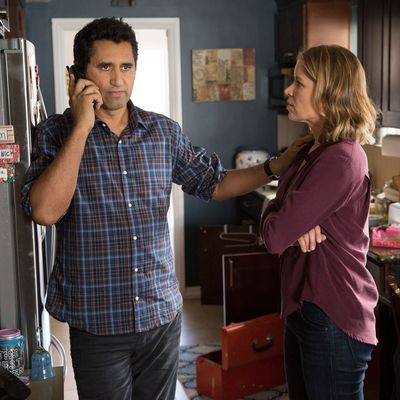
The pilot for The Walking Dead is still easily the best episode of the series. It combined genuine despair with tense action sequences, and instantly set up what the overall premise of the show still is, 67 episodes in: Man Fights Rot. Rick Grimes isn’t just battling walkers, he’s trying to fight against the decaying of humanity, the utter end of its culture and societies. Mostly, he fails. The pilot of TWD’s new spinoff Fear the Walking Dead is less effective, and seems to set up only things we already understand but that the characters don’t yet know. No, people are not simply getting the flu; no, there’s no treatment; no, society will not survive; no, most of you will not survive either; no, there’s no clearly immune population; no, you can’t just shoot them willy-nilly, it has to be in the head; no, the CDC won’t be able to do anything; no, you are not the father. I just threw in that last one, but the rest of it stands.
Fear is set in Los Angeles, at the dawn of the zombie outbreak. Our entrée into the undead is Nick (Frank Dillane), a heroin addict who first encounters a walker while coming to after a gnarly drug sesh in a junkie enclave. But he can’t tell anyone what he saw, because who would believe him? Well, probably more people if you took a picture or something with your phone, but okay. Eventually, he enlists the help of his mother, Madison (Kim Dickens), a high-school guidance counselor, and Mom’s boyfriend, Travis (Cliff Curtis), an English teacher. We eventually meet Travis’s ex-wife (Elizabeth Rodriguez) and their son, too (Lorenzo James Henrie). Madison and Travis’s students have noticed strange goings-on, which they mention in passing, but that can’t be … related … to this, can it?
Of course it is! Because we already know that. Hmm, what’s wrong with that guy? Hey, guy! Can you hear me? Hey! Hey! Why are you walking like that? Why are you getting so close to me? Oh, nooooo. That’s more or less a transcript of a few scenes from FTWD — and it’s not tense at all, because anyone who’s seen an episode or even a subway poster for The Walking Dead knows what’s up.
That means FTWD has to rely on the how of the apocalypse, the to whom. And unfortunately, despite strong performances, particularly from Dickens and Curtis, it’s hard to care what happens to anyone, or to listen to the dialogue and not pray for some kind of bear attack. Madison frets over the state of Nick’s addiction and admits that she doesn’t understand all of it, and maybe she doesn’t want him to come home since he’s dangerous and difficult at best. “What does that make me?” she wonders. “Human,” Travis says. Madison scoffs. “Weak,” she replies. Maybe the zombies are onto something. Daughter Alicia (Alycia Debnam-Carey) watches a zombie snuff movie on her friend’s phone in math class; the teacher lecturing has written on the board, “Chaos Theory.” We see Travis teaching a class on the Jack London short story “To Build a Fire,” and he appears to be the cool teacher, sliding into a desk next to a student. The student is unmoved. “I don’t care about building a fire. I got a stove. I got heat,” the kid sasses, and the class laughs along. Not for long, you don’t, the show might as well say out loud.
Nick: Why would he build a fire? Think about it, think about it.
Student: To not die.
Nick: Nailed it! It’s man versus nature! London’s trying to teach us how not to die.
Oh, word? I wonder if we are all going to need to know how not to die. Perhaps next we can all discuss A Journal of the Plague Year.
Zombie stories are not required to be political, but they’re certainly permitted to be so. Given what we know about our culture’s approach to, say, Ebola, or measles, or AIDS, we actually do know a good amount about how American society en masse responds to news about infectious disease. We also know about responses to police brutality. Fear the Walking Dead could have something to say, but it’s not equipped or willing to do so. In episode two, the panic starts to spread, and seemingly more people are becoming aware of the growing zombie danger. The police shoot and kill a homeless zombie — and this sets off a huge anti-police-brutality rally. Is the show really making a Zombie Lives Matter parallel? Oy. FTWD seems to have seized on the imagery of the current American condition without actually responding to the ideas. That refusal to be about anything is an issue on The Walking Dead, too, but it feels additionally egregious here for a few reasons, including that the show is literally titled Fear the Walking Dead. This is what you were supposed to fear, show. Not the zombies, not the occasionally bad acting, not the crazy eyes. The emptiness. Now, that’s scary.




